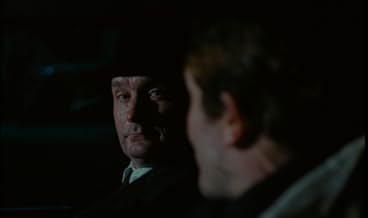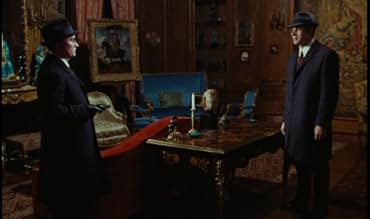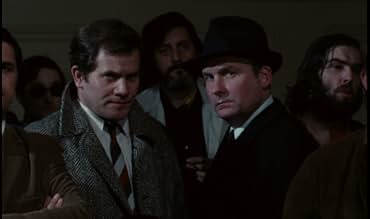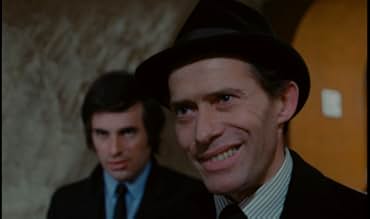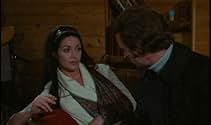Barnero ist ein verbitterter Polizist, der in einer Stadt arbeitet, die er für verkommen hält.Barnero ist ein verbitterter Polizist, der in einer Stadt arbeitet, die er für verkommen hält.Barnero ist ein verbitterter Polizist, der in einer Stadt arbeitet, die er für verkommen hält.
Gianni Garko
- Dan Rover
- (as John Garko)
Anne Carrère
- Christine
- (as Anne Carrere)
Théo Sarapo
- Lupo
- (as Theo Sarapo)
Jean-Claude Bercq
- Germain
- (as Jean-Claude Berck)
Stéphan Holmes
- Le jeune garçon
- (as Stephan Holmes)
Empfohlene Bewertungen
This was a rather more than faithful adaptation of the Pierre Lesou's novel. A fierce story about two vengeance schemes involved one in the other. Two friends decide to avenge the death of one of their own and then kill a cop whose his friend decides to avenge him...Follow me? You have here one of best Michel Constantin's performances ever. Don't miss him facing Michel Bouquet. His lines are unforgettable. But something is missing, if you compare to the book. HOW DAN ROVEL'S CHARACTER GETS OUT OF JAIL?
No one seems to have noticed this detail.
Typical from Yves Boisset about the power of police, and the way cops sometimes can trespass the law. A true powerful film.
No one seems to have noticed this detail.
Typical from Yves Boisset about the power of police, and the way cops sometimes can trespass the law. A true powerful film.
Generally,this movie is considered the first "true " film of this director .It had huge problems with the censorship (it was not to be the last time : "RAS" and "Le Juge Fayard Dit Le Sheriff" had also problems) because of the way it showed the police ,whose "methods" were close to those of gangsters;in order not to ruin his producer ,the director cut 8 minutes and remade a whole scene.
It's still watchable today ,thanks to Boisset's nervy style even before the cast and credits :the prologue is violence itself and violence is present -such an intensity was not common in 1970-all through the movie till the last pictures.
"The role of the police is to take care of the society as it is ,not to reform it" says chief superintendent Adolfo "thunderball" Celi;and another sentence has remained famous;the cop (Michel bouquet) to Françoise Fabian " a body which works well is not a body which does not produce waste ,but which eliminates them properly".
We feel the "after 68" zeitgeist in the meeting at the beginning of the movie and the posters in Rufus's house shows Boisset's anti -militarism -which will come to the fore with "RAS" in 1973);one of the posters reads:"army humiliates,imprisons and kills "
That said,the characters are cardboard ("deep" figures have never been Boisset's forte and never will),the screenplay rather simplistic -compared to the works to come such as "Dupont La Joie",but it has become a film noir semi-classic ;indeed,Michel Bouquet's character verges on madness nay psychopathy with a straight face and a total lack of humanity.
Yves Boisset was actually the successor of André Cayatte ,with more aplomb and less endearing characters .All through the seventies,he tried to clean the Augean stables of his country.
NB "Condé " in French has 2 meanings
a)cop
b)a deal which allows one to pursue illegal activities in exchange for information; the second meaning can be applied to Françoise Fabian's brother who wants to stay loyal and pure and refused the deal
It's still watchable today ,thanks to Boisset's nervy style even before the cast and credits :the prologue is violence itself and violence is present -such an intensity was not common in 1970-all through the movie till the last pictures.
"The role of the police is to take care of the society as it is ,not to reform it" says chief superintendent Adolfo "thunderball" Celi;and another sentence has remained famous;the cop (Michel bouquet) to Françoise Fabian " a body which works well is not a body which does not produce waste ,but which eliminates them properly".
We feel the "after 68" zeitgeist in the meeting at the beginning of the movie and the posters in Rufus's house shows Boisset's anti -militarism -which will come to the fore with "RAS" in 1973);one of the posters reads:"army humiliates,imprisons and kills "
That said,the characters are cardboard ("deep" figures have never been Boisset's forte and never will),the screenplay rather simplistic -compared to the works to come such as "Dupont La Joie",but it has become a film noir semi-classic ;indeed,Michel Bouquet's character verges on madness nay psychopathy with a straight face and a total lack of humanity.
Yves Boisset was actually the successor of André Cayatte ,with more aplomb and less endearing characters .All through the seventies,he tried to clean the Augean stables of his country.
NB "Condé " in French has 2 meanings
a)cop
b)a deal which allows one to pursue illegal activities in exchange for information; the second meaning can be applied to Françoise Fabian's brother who wants to stay loyal and pure and refused the deal
Yves Boisset is a very special director, he has made many good films, most importantly, in my opinion, "The Assassination" (1972), with the great Gian Maria Volontè and many other exceptional actors, and "Dog Day"(1984) , with the unparalleled Lee Marvin. In "The Assassination", as a corrupt lawyer, we find the extraordinary Michel Bouquet, who here, in "The Cop", he is the cop, a policeman like you have not seen in other movies, a cop with an original philosophy, kindred somehow, with Clint Eastwood's Dirty Harry. But different! Michel Bouquet is an actor who does not need too many specific means or too many replicas to create memorable characters, Michel Bouquet is an absolute force, only by the way he looks, moves and breathes. Likewise, but in another register, it is Michel Constantin, who also plays a smaller role, but, as usual, natural, impeccable. Françoise Fabian is beautiful and natural. Probably the best part of Gianni Garko. So, Bernard Fresson. Adolfo Celi, a small role too but, as usual, very effective. Rufus, Théo Sarapo, Henri Garcin, Pierre Massimi, the same, very good. Need absolutely to be seen!
Yves Boisset's "Un condé" (from the French slang for cop) is a sort of Gallic "Dirty Harry", a police thriller that raises awkward questions about how far across the line the good guys can step in order to clear up society's mess. Inspector Favenin (Michel Bouquet) undoubtedly goes too far. When his idealistic but ineffectual partner is killed pursuing the culprits of a gang revenge attack (a pursuit instigated by Favenin himself), the embittered cop, realising that conventional police methods won't work, takes matters into his own hands.
At first, it's hard to resist cheering as he takes on the worst of the gang thugs using their own methods. But when his ruthless pursuit for revenge starts to impinge on the more sympathetic characters in the story, including an essentially decent man who gets beaten up in front of his young son, we are forced to question where our sympathies lie.
Boisset's functional, low-key direction, while lacking the stylistic flamboyance of Melville, serves the story well, and makes the frequent outbursts of violence all the more shocking. Bouquet is well-cast as the soft-spoken, solitary, buttoned-up and near-psychopathic Favenin, a more complex (and scarier because unpredictable) character than Eastwood's Harry Callahan. Whereas in "Dirty Harry" the hero's methods are questionable but his goals are morally correct, Favenin clearly has more personal motives that are not necessarily consistent with the public good. Even so, his pragmatic boss is willing to overlook his actions provided they can be covered up.
In a minor role, Michel Constantin, a stalwart of many French gangster movies, gives one of his best performances here as a fatalistic hired gun; his confrontation with Favenin is a highlight of the film.
At first, it's hard to resist cheering as he takes on the worst of the gang thugs using their own methods. But when his ruthless pursuit for revenge starts to impinge on the more sympathetic characters in the story, including an essentially decent man who gets beaten up in front of his young son, we are forced to question where our sympathies lie.
Boisset's functional, low-key direction, while lacking the stylistic flamboyance of Melville, serves the story well, and makes the frequent outbursts of violence all the more shocking. Bouquet is well-cast as the soft-spoken, solitary, buttoned-up and near-psychopathic Favenin, a more complex (and scarier because unpredictable) character than Eastwood's Harry Callahan. Whereas in "Dirty Harry" the hero's methods are questionable but his goals are morally correct, Favenin clearly has more personal motives that are not necessarily consistent with the public good. Even so, his pragmatic boss is willing to overlook his actions provided they can be covered up.
In a minor role, Michel Constantin, a stalwart of many French gangster movies, gives one of his best performances here as a fatalistic hired gun; his confrontation with Favenin is a highlight of the film.
Yves Boisset is not one of the famous French directors, which amplifies for me the (pleasant) surprise of watching his 1970 film 'Un condé' ('The Cop'). The director, who had been Jean-Pierre Melville's assistant, among others, demonstrates here that he not only learned many of the secrets of the trade from his master, but also that he had the courage to combine the genre of film noir (a tradition in French movies) with political cinema. The result makes of 'Un condé' both violent entertainment in the genre of the movies in which the cops are only a little less evil than the gangsters they face, and a political film in which a crisp message and characters immersed in moral corruption. In perfect synchronicity with what was happening at the same time in American cinema, 'Un condé' brings to the screen a vigilante hero with whom, as spectators, we identify for a while, until the moment the violence accumulates and we begin to question whether justice achieved through such illegal means remains justice, even in situations where there seems to be no alternative to the use of violence.
I liked the way this story is told. It starts with a settlement of accounts in the underworld between a gang of mobsters who do not hesitate to use any kind of violence to achieve their goals and the owner of a place who refuses to give up and pays with his life. When his sister and his best friend decide to take revenge, we, as spectators, cannot help but empathize with their feelings. A pair of policemen who seem incorruptible and who, because they are honest, are marginalized in a system that prefers to reach a 'modus vivendi' with criminals, comes into action. When one of them is killed by the same gang of mobsters, revenge seems justified, and again, as spectators, we are involved. The problem is that the world described in the film does not know clean methods to achieve its goals. Revenge means homicide, and police use Gestapo-like methods of interrogation. Made in 1970, 'Un condé' contains a strong post-1968 message of protest against police violence, which Yves Boisset will continue in his future films.
Made during the heyday of the 'film noir' genre in French cinema, a genre that had absorbed some of the talents of the New Wave, 'Un condé' is not inferior to many of the best-known achievements of the genre. The clear and intelligent script, the consistent visual conception and the fact that the characters are not morally judged for what they do contribute to this. They are committing atrocities for noble causes: friendship, fighting crime, opposing police corruption. If there is a culprit, this is the system that does not leave them too many alternatives. Michel Bouquet creates one of the best roles of his career and Michel Constantin adds another role to the ones that made him a favorite actor in gangster movies over several decades. I recommend the film, which in my opinion falls into the category of cinematic jewels that need to be rediscovered.
I liked the way this story is told. It starts with a settlement of accounts in the underworld between a gang of mobsters who do not hesitate to use any kind of violence to achieve their goals and the owner of a place who refuses to give up and pays with his life. When his sister and his best friend decide to take revenge, we, as spectators, cannot help but empathize with their feelings. A pair of policemen who seem incorruptible and who, because they are honest, are marginalized in a system that prefers to reach a 'modus vivendi' with criminals, comes into action. When one of them is killed by the same gang of mobsters, revenge seems justified, and again, as spectators, we are involved. The problem is that the world described in the film does not know clean methods to achieve its goals. Revenge means homicide, and police use Gestapo-like methods of interrogation. Made in 1970, 'Un condé' contains a strong post-1968 message of protest against police violence, which Yves Boisset will continue in his future films.
Made during the heyday of the 'film noir' genre in French cinema, a genre that had absorbed some of the talents of the New Wave, 'Un condé' is not inferior to many of the best-known achievements of the genre. The clear and intelligent script, the consistent visual conception and the fact that the characters are not morally judged for what they do contribute to this. They are committing atrocities for noble causes: friendship, fighting crime, opposing police corruption. If there is a culprit, this is the system that does not leave them too many alternatives. Michel Bouquet creates one of the best roles of his career and Michel Constantin adds another role to the ones that made him a favorite actor in gangster movies over several decades. I recommend the film, which in my opinion falls into the category of cinematic jewels that need to be rediscovered.
Wusstest du schon
- WissenswertesAlthough his film is close to Pierre Lesou's novel, director Yves Boisset confessed that, during the scene between Michel Constantin and Michel Bouquet, he was influenced by Jean-Pierre Melville's films' atmosphere and dialogue.
- Alternative VersionenDue to pressure from then French Minister of the Interior Raymond Marcellin, the film had a tough time getting approved for release and director Yves Boisset was finally forced to cut a few lines of dialogue and reshoot the interrogation scene. The film was shown uncut and with the original scene internationally. In France, the original scene can be seen as a bonus feature on home video.
- VerbindungenReferenced in Parole de cinéaste: Yves Boisset: le cinéaste le plus censuré de France (2013)
Top-Auswahl
Melde dich zum Bewerten an und greife auf die Watchlist für personalisierte Empfehlungen zu.
Details
- Erscheinungsdatum
- Herkunftsländer
- Sprachen
- Auch bekannt als
- The Cop
- Drehorte
- Fourges, Vexin-sur-Epte, Eure, Frankreich(ending scene at the water mill)
- Produktionsfirmen
- Weitere beteiligte Unternehmen bei IMDbPro anzeigen
- Laufzeit
- 1 Std. 35 Min.(95 min)
- Sound-Mix
- Seitenverhältnis
- 1.66 : 1
Zu dieser Seite beitragen
Bearbeitung vorschlagen oder fehlenden Inhalt hinzufügen

